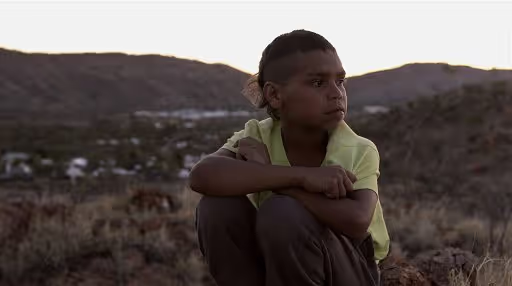In My Blood It Runs Delve Deeper Reading List Adult Fiction
Adult Fiction

Behrendt, Larissa. Home. UQP, 2004.
A story of homecoming, this absorbing novel opens with a young, city-based lawyer setting out on her first visit to ancestral country. Candice arrives at "the place where the rivers meet", the camp of the Eualeyai where in 1918 her grandmother Garibooli was abducted. As Garibooli takes up the story of Candice's Aboriginal family, the twentieth century falls away. Garibooli, renamed Elizabeth, is sent to work as a housemaid, but marriage soon offers escape from the terror of the master's night-time visits. Her displacement carries into the lives of her seven children - their stories witness to the impact of orphanage life and the consequences of having a dark skin in post-war Australia. Vividly rekindled, the lives of her family point the direction home for Candice. Home is a powerful and intelligent first novel from an author who understands both the capacity of language to suppress and the restorative potency of stories that bridge past and present.
Birch, Tony. White Girl. UQP. 2019.
A searing new novel from leading Indigenous storyteller Tony Birch that explores the lengths we will go to in order to save the people we love. Odette Brown has lived her whole life on the fringes of a small country town. After her daughter disappeared and left her with her granddaughter Sissy to raise on her own, Odette has managed to stay under the radar of the welfare authorities who are removing fair-skinned Aboriginal children from their families. When a new policeman arrives in town, determined to enforce the law, Odette must risk everything to save Sissy and protect everything she loves. In The White Girl, Miles-Franklin-shortlisted author Tony Birch shines a spotlight on the 1960s and the devastating government policy of taking Indigenous children from their families.
Chi, Jimmy & Knuckles. Bran Nue Dae: A Musical Journey. Currency Press, 1991.
Willy and Old Uncle Tadpole flee the city to embark on a journey of personal discovery and outrageous adventures back to their Aboriginal homeland
Keneally, Thomas. The Chant of Jimmie Blacksmith.HarperCollins – AU, 2013.
When Jimmie Blacksmith marries a white woman, the backlash from both Jimmie's tribe and white society initiates a series of dramatic events. As Jimmie tries to survive between two cultures, tensions reach a head when the Newbys, Jimmie's white employers, try to break up his marriage. the Newby women are murdered and Jimmie flees, pursued by police and vigilantes. The hunt intensifies as further murders are committed, and concludes with tragic results. Thomas Keneally's fictionalized account of the 1900 killing spree of half-Aboriginal Jimmy Governor is a powerful story of a black man's revenge against an unjust and intolerant society.
Lucashenko, Melissa. Too Much Lip. UQP, 2019.
A dark and funny new novel from the multi-award-winning author of Mullumbimby. Too much lip, her old problem from way back. And the older she got, the harder it seemed to get to swallow her opinions. The avalanche of bullshit in the world would drown her if she let it; the least she could do was raise her voice in anger. Wise-cracking Kerry Salter has spent a lifetime avoiding two things – her hometown and prison. But now her Pop is dying and she’s an inch away from the lockup, so she heads south on a stolen Harley. Kerry plans to spend twenty-four hours, tops, over the border. She quickly discovers, though, that Bundjalung country has a funny way of grabbing on to people. Old family wounds open as the Salters fight to stop the development of their beloved river. And the unexpected arrival on the scene of a good-looking dugai fella intent on loving her up only adds more trouble – but then trouble is Kerry’s middle name. Gritty and darkly hilarious, Too Much Lip offers redemption and forgiveness where none seems possible.
Pilkington, Doris. Follow the Rabbit-Proof Fence.UQP, 1996.
This is an extraordinary story of courage and faith. It is based on the actual experiences of three girls who fled from the repressive life of Moore River Native Settlement, following along the rabbit-proof fence back to their homelands. Assimilationist policy deemed these girls were taken from their kin and their land in order to be made white.
Scott, Kim. True Country. Freemantle Press, 1993.
Billy, a young school teacher, arrives in Karnama, a remote settlement in Australia’s far north, in search of his own history, his Aboriginality, and his future. Gradually the outsider is drawn in, and finds himself engaging deeply, irrevocably, not only with the moments of desolation and despair, but also with the great heart and spirit of the people. Finally, the exile enters the true country.
Wright, Alexis. The Swan Book. Washington Square Press, 2018.
Oblivia Ethelyne was given her name by an old woman who found her deep in the bowels of a gum tree, tattered and fragile, the victim of a brutal assault by wayward local youths. These are the years leading up to Australia’s third centenary, and the woman who finds her, Bella Donna of the Champions, is a refugee from climate change wars that devastated her country in the northern hemisphere. Bella Donna takes Oblivia to live with her on an old warship in a polluted dry swamp and there she fills Oblivia’s head with story upon story of swans. Fenced off from the rest of Australia by the Army, its traditional custodians left destitute, the swamp has become “the world’s most unknown detention camp” for Indigenous Australians.
